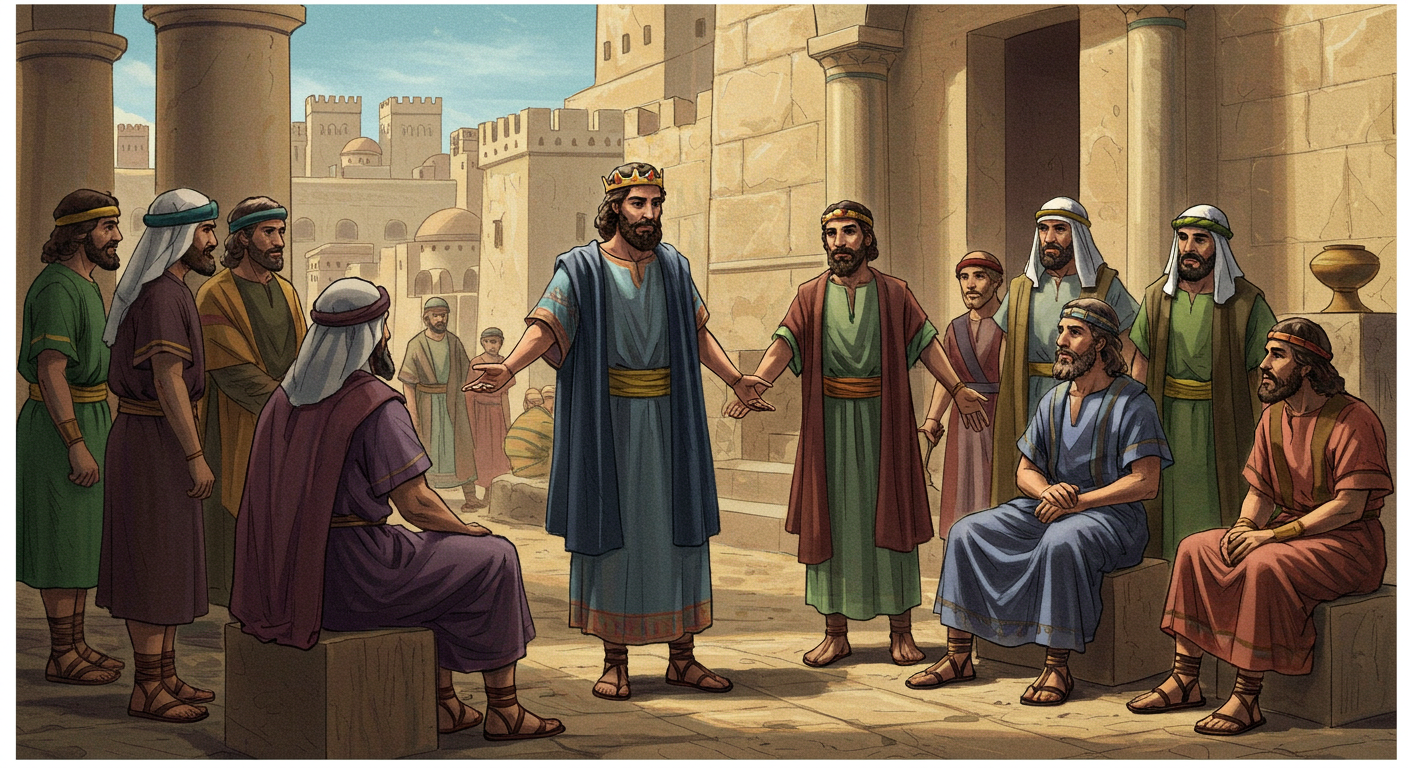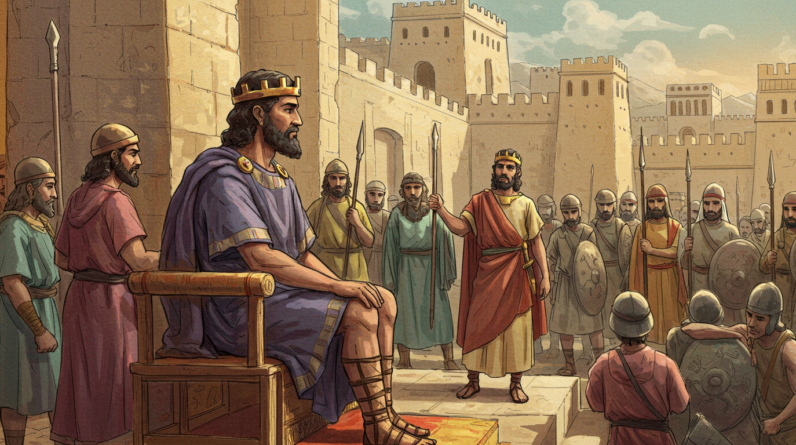Explore Nadab’s leadership in biblical Israel, highlighting his short reign’s lessons on power and legacy amidst spiritual challenges and historical complexities.
Nadab: A Study of Leadership and Legacy in Biblical Israel

Introduction
When you think of leadership in the Bible, names like David, Moses, or Solomon might spring to mind. But what about Nadab? Have you ever paused to consider the impact of his leadership on Israel’s history? Nadab’s story offers a unique lens through which we can explore the often dark and shadowed corners of leadership dynamics in ancient Israel.
Nadab was the son of Jeroboam, the first king of the northern Israelite kingdom after the split following Solomon’s reign. His brief leadership tenure is noteworthy, not for its triumphs but for the lessons it imparts on the cyclical nature of power and piety. Nadab’s reign, though short-lived, underscores the delicate balance between leadership, legacy, and divine intervention in Israel’s narrative.
Historical and Cultural Context
Israel in Nadab’s Time
The period of Nadab’s life was one of turbulent transition and division. After Solomon’s death, the United Kingdom of Israel fragmented into two: the northern kingdom of Israel and the southern kingdom of Judah. Social structures were strained as tribal loyalties and old rivalries resurfaced. Economically, the people faced instability, largely due to the fractured governance.
This was a time when prophets warned of impending doom should the people continue their wayward practices. The spiritual climate was also tense; the worship of Yahweh was mingled with pagan practices, drawing the ire of prophets who called for reform and repentance.
Setting the Stage
Nadab’s ascension to the throne was necessitated by the volatile political atmosphere. After the division, his father Jeroboam led the northern tribes, breaking away from the Davidic line. Nadab inherited not just a throne but the challenges of sustaining a nascent kingdom, rife with spiritual dissonance and political scheming.
Biographical Overview
Early Life and Calling
Nadab was born into a tumultuous period where the northern tribes were forging their identity apart from Judah. Raised as the future king, his upbringing would have been steeped in the complexities of leadership under the shadow of possible divine disfavor due to Jeroboam’s religious practices.
The scriptures do not offer extensive detail about Nadab’s early life, but his ascension came swiftly, as noted in 1 Kings 14:20, where Jeroboam’s death is recorded, ushering Nadab to power.
Major Milestones and Events
Nadab’s reign is primarily chronicled in 1 Kings 15:25-31. His two-year rule was marked by continued conflict with the Philistines and internal strife. His assassination by Baasha, a military officer, underscored the precariousness of his throne and set the stage for further instability.
Key Biblical Narratives and Passages
Primary Scripture References
The brief account of Nadab is captured concisely in 1 Kings 15:25-31. These verses recount his ascension, his ongoing military engagements, and his demise.
Contextual Analysis
Within the greater narrative of Israel’s history, Nadab’s story is a cautionary tale of inherited conflict and unfulfilled potential. Theological messages here include the consequences of persistent idolatry and the fickle nature of political alliances. Nadab’s failure to deviate from his father’s path of sin is a recurring biblical theme stressing the need for reform and divine obedience.
Leadership Qualities and Challenges
Core Leadership Traits
Nadab’s leadership reveals certain qualities by their absence rather than their presence. It’s challenging to pinpoint positive qualities due to the brevity of his reign and the scant historical records. Yet, the narrative implicitly critiques his inability to establish a legacy of devout leadership and distinguish himself from his father’s shortcomings.
Challenges and Controversies
His short-lived rule was riddled with substantial controversies. Not only did he fail to secure his kingdom’s safety, particularly against Baasha and the Philistines, but also continued the idolatrous practices set by his father. This included the significant moral dilemma of leading a nation in spiritual decline, ultimately leading to his downfall as noted in the biblical narrative.
Legacy and Impact
Immediate Impact
Nadab’s immediate impact was one of continued instability both spiritually and politically. His assassination and the rise of Baasha reinforced the era’s chaotic volatility. It was a period where leadership was seen more as a powder keg than a stable institution.
Long-Term Influence
In the grand tapestry of Israel’s history, Nadab’s legacy is overshadowed by the perpetual judgment pronounced upon Jeroboam’s line. He serves as a sobering reminder of the consequences when leaders fail to steward their spiritual and political responsibilities effectively.
Modern Relevance
For today’s readers, Nadab’s story mirrors the complexities of leadership in times of spiritual and political turmoil. It prompts reflections on the legacies we cultivate and the need for integrity and foresight in leadership roles.
Scriptural and Scholarly Analysis
Comparative Analysis
Comparing different translations, such as the NIV and ESV, can provide subtle differences in interpretation, particularly in the tone and structure of the passages recounting Nadab’s story in 1 Kings 15:25-31.
Theological Implications
Nadab’s narrative often incites theological debate, particularly regarding divine sanction and leadership. His very brief rule is seen as a testament to the prophetic declarations against his father’s house, highlighting divine justice and the severe consequences of disobedience.

Conclusion
Summary of Key Points
Nadab’s leadership reflects a short, tumultuous chapter in Israel’s history marked by internal strife and spiritual lapses. His reign serves as a chronicled downfall, embedded in the larger narrative of Israel’s divided monarchy and the challenges it faced.
Final Reflections
While Nadab might not be the most illustrious of Biblical figures, his story is a potent reminder of leadership’s pitfalls when divine commandments are disregarded. Although his legacy might be overshadowed by his failures, there remains a critical lesson on the necessity for reformative leadership rooted in faithfulness and accountability.
Call to Reflection or Action
As you reflect on Nadab’s story, consider the nature of leadership you encounter or embody in your life. How do you navigate the delicate balance of guidance and responsibility?
Acknowledgment: All Bible verses referenced in this article were accessed via Bible Gateway (or Bible Hub).







